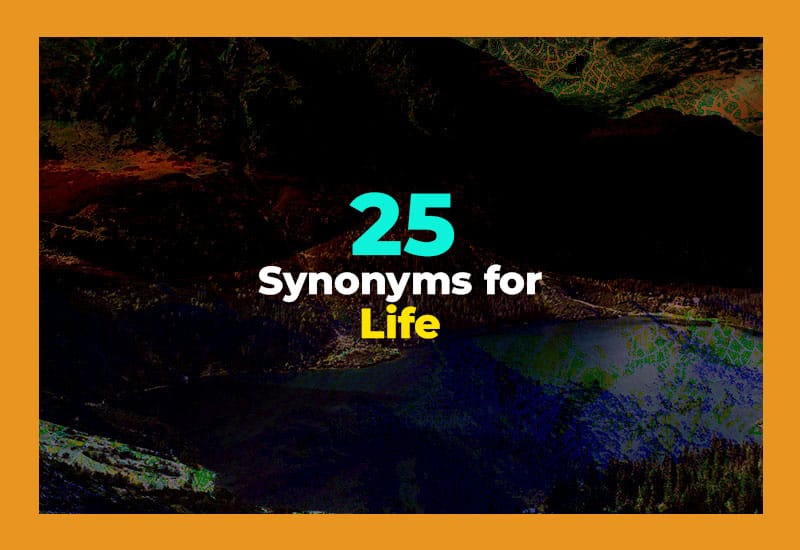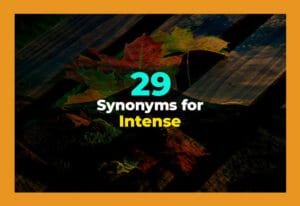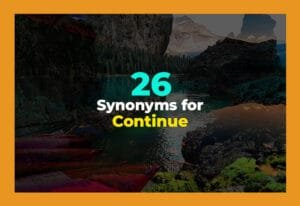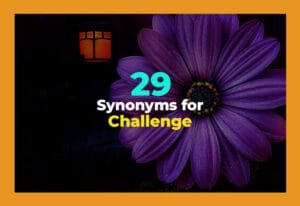You know how life can feel so full of moments, energy, and stories? Sometimes, the word "life" feels too simple for everything it means. Whether it's the journey we take, the spirit inside us, or the time we have, there are many cool ways to say "life." Let's explore some fun and easy words you can use instead, and see how they fit in real sentences. It's like having a colorful box of words to describe our amazing world!
1. Existence
Existence means simply being alive or present in the world. For example, “Her existence on Earth is a beautiful story.” It's a formal way to talk about life itself, focusing on the fact that someone or something is real and alive. We often use existence when thinking about life in a deep or philosophical way. It can also describe the presence of things or ideas, not just people. This word helps us remember that life is about simply being here and now.
2. Being
The word being refers to a living creature or the state of existing. For example, “Every human being deserves respect and kindness.” It's a simple, powerful word that highlights the fact that someone or something is alive and conscious. Being can also mean the experience of existing in the world. We use it when we want to focus on life as a presence or a state, rather than just action or events. It's a thoughtful way to talk about life's basic meaning.
3. Living
Living means having life or being alive. For example, “The forest is full of living animals and plants.” It focuses on the fact that something breathes, grows, and exists actively. Living is used to describe anything that isn't dead, including people, animals, and plants. It also describes the condition of being alive in a way that involves activity and energy. Saying "living" reminds us that life is happening right now, full of motion and growth.
4. Animation
The word animation means the quality that makes something alive or lively. For example, “Her animation during the speech kept everyone interested.” It can also mean the energy and spirit in a person or thing. While often used to describe cartoons or movies, animation really talks about life as movement and excitement. It's a lively word that brings the idea of life to something that might seem still or quiet. Animation shows life as fun and full of energy.
5. Vitality
Vitality means full of life, energy, and strength. For example, “He showed great vitality after recovering from illness.” This word focuses on the health and power inside a living being. Vitality tells us how alive and energetic someone feels. It's often used to describe people or places that are bright and full of life. When you want to show the active, strong side of life, vitality is a perfect choice.
6. Spirit
The word spirit refers to the invisible force that gives life and energy. For example, “Her spirit was unbreakable, no matter the challenges.” It's often used to talk about the soul or inner life of a person. Spirit can mean courage, enthusiasm, or the energy that keeps us going. It's a word that connects life with feelings and motivation, not just physical being. Spirit helps us describe life as something powerful and emotional.
7. Soul
Soul means the deepest part of a person that gives them life and personality. For example, “Music touched his soul and made him feel alive.” It is often seen as the true self inside us, beyond the body. Soul talks about the life force that feels, thinks, and loves. It's a poetic and emotional way to describe life, focusing on what makes us unique and real.
8. Breath
Breath is the air taken in and out that shows life is present. For example, “With each breath, she felt more connected to life.” It symbolizes life because breathing is essential for living. Breath reminds us that life is fragile and precious, happening in every moment. People often use breath as a symbol of being alive or waking up to life's beauty.
9. Survival
The word survival means staying alive despite difficulties. For example, “The survival of the fittest is a natural rule in the wild.” It focuses on the struggle and strength needed to keep living. Survival shows us the tough side of life — how living things keep going even when things are hard. It's a strong word that highlights determination and endurance.
10. Reality
Reality means the true state of things, including life as it really is. For example, “He accepted the reality of growing older with grace.” It shows life as it happens, without dreams or imagination. Reality helps us understand life as facts, feelings, and experiences that are real and present. It reminds us to live in the moment and face life honestly.
11. Experience
The word experience means the things we live through and learn from. For example, “Travel gave her new experiences and a fresh view on life.” It focuses on the events and feelings that shape our living. Experience is a way to talk about life's story and what we gain from it. Saying "experience" makes life sound like an exciting journey full of lessons.
12. Journey
Journey means the process of moving through life over time. For example, “Life is a journey with many ups and downs.” It's a popular word to describe life as a path or adventure. Journey highlights progress and change, showing life as something ongoing and full of discoveries. It encourages us to enjoy every step, not just the end.
13. Lifespan
The word lifespan means the length of time a living thing is alive. For example, “The average lifespan of a butterfly is just a few weeks.” It focuses on the duration of life from beginning to end. Lifespan helps us think about life in terms of time and limits. It's useful when talking about how long someone or something can live.
14. Lifetime
Lifetime means the whole period of a person's or thing's life. For example, “She achieved many dreams during her lifetime.” It's similar to lifespan but is often used to talk about memories and achievements. Lifetime makes us think about everything that happens from birth to death. It's a warm word that captures the full story of life.
15. Era
Era means a long period of time with special events or qualities. For example, “The Victorian era changed many parts of life in England.” It talks about life in history, focusing on groups of years rather than individuals. Era helps us think about life as part of bigger time periods that shape the world.
16. Epoch
The word epoch means a notable period in history or life. For example, “The invention of the internet marked a new epoch for communication.” It's a formal way to talk about life periods that are important or different from others. Epoch highlights change and progress in life over time.
17. Age
Age means the number of years someone or something has lived. For example, “At the age of five, children begin to learn reading skills.” It also refers to a period in life or history. Age helps us understand life in terms of time passed and stages reached. It's simple and easy to use in many contexts.
18. Time
Time is the ongoing flow of moments that make up life. For example, “Time heals many wounds and teaches patience.” It's a broad word that connects life to seconds, minutes, and years passing by. Time reminds us that life is always moving and changing, so we should cherish every moment.
19. World
The word world means the place where life happens — Earth or any living space. For example, “She traveled the world to explore different cultures and ways of life.” It talks about life as part of a bigger home, full of variety and people. World helps us see life as connected to the planet and others around us.
20. Nature
Nature means the physical world and its living things. For example, “Spending time in nature helps me feel alive and peaceful.” It connects life to plants, animals, weather, and earth. Nature reminds us that life is part of a bigger system that we depend on and enjoy.
21. Entity
The word entity means something that exists as a separate and distinct being. For example, “Every person is a unique entity with their own thoughts and feelings.” It's a formal way to talk about life as an individual thing or being. Entity helps us think about life as something real and independent.
22. Consciousness
Consciousness means being aware of yourself and the world around you. For example, “Meditation helps increase your consciousness and feel more connected to life.” It focuses on the mental part of life — knowing, thinking, and feeling. Consciousness shows that life is not just physical but also mental and emotional.
23. Energy
The word energy means the power and strength that make life active. For example, “Kids have so much energy, it's amazing!” Energy helps us see life as movement, action, and excitement. It's a lively word that reminds us life is full of power and force.
24. Pulse
Pulse means the steady beat of the heart that shows life is present. For example, “The doctor checked her pulse to make sure she was healthy.” It's a small but important sign of life in the body. Pulse symbolizes the rhythm and continuity of life.
25. Vigor
Vigor means having strength, health, and enthusiasm for life. For example, “He tackled challenges with great vigor and hope.” It shows life as active, strong, and full of spirit. Vigor encourages us to live fully and energetically.

Final Thoughts
Life is such a big and wonderful idea that simple words don't always cover it. Using different synonyms helps us express the many sides of life — from its energy and spirit to its time and journey. Each word gives us a new way to think about what it means to be alive. Try mixing these words in your writing and speech to make life's story even more colorful and fun. Life is rich, and now your words can be too!









